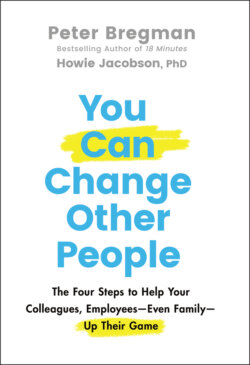Читать книгу You Can Change Other People - Howie Jacobson, Joel McDonald - Страница 17
CHAPTER 5 POWER 3: EMOTIONAL COURAGE: IF YOU ARE WILLING TO FEEL EVERYTHING, YOU CAN DO ANYTHING
ОглавлениеWhat if, instead of criticizing her spreadsheet or redoing it, Spencer sat down with Octavia to help her grow her ownership of the problem and increase her capability to solve it?
Are they done?
Not so fast. There's something missing. A challenge that is rarely addressed yet causes many failed change attempts: the massive gap between knowing what to do and actually doing it.
Change is hard. And admitting that you need to change can be very hard. Facing colleagues and asking for their help in changing can be extremely hard. And struggling to develop new skills can be downright terrifying, especially when you have to give up old familiar patterns without yet having developed new ones to replace them.
Octavia needs the courage to feel all those uncomfortable feelings, even as she acts in ways that trigger and intensify them.
Think for a moment about a conversation you know you should have with someone, yet haven't. Is there an issue you're reluctant to share with a partner? A conflict at work that you're not addressing? Subpar performance from someone you're responsible for?
Why haven't you had that conversation yet?
Is it because you're not motivated? Because you just don't care enough to bother? I doubt it. The very fact that it's on your mind indicates that you can feel its importance.
Is it because you don't have the knowledge or skills to have the conversation? You don't know what to say? How to say it? I'd bet you know exactly what you want to say and I'm sure you're skilled enough to say it. In fact, I imagine you've been thinking about it over the course of some time. Sure, you could tweak the words, maybe make them more elegant, but you know what you need to convey.
Is it because you don't have the time? Haven't had the opportunity? Again, in my experience, that's not really standing in your way. When something's important, you make the time. You find the opportunity or proactively create it.
Those are usually the things that we try to solve for when we want to make change: motivation, knowledge, skills, time, and opportunity. And they are the things that companies try to solve for—with communication plans, training programs, and time management—when attempting to spread change throughout their organizations. But those are not the things that, in the end, prevent people from moving forward.
So then what's stopping you?
Feeling.
Think about it. If you have that conversation, you'll likely feel something uncomfortable. Something you're avoiding. Something you don't want to feel.
Maybe your partner will respond badly, and you'll get into an argument. Maybe they'll feel hurt, and you'll feel bad for having hurt them. Maybe they'll get defensive and accuse you of a bunch of things, triggering your shame, and you'll respond defensively. Maybe they'll just get quiet and stone-faced and shut down communication entirely. Maybe you'll lose your temper.
But if you don't have the conversation, you won't have to feel what you don't want to feel. It's a simple and reliable strategy: If you don't want to feel uncomfortable, don't do things that feel uncomfortable.
Although this approach may be simple and reliable, it's not useful. It leads to procrastination and dysfunction. What can you do instead? Expand your capacity to feel uncomfortable feelings. Build your emotional courage—and theirs.
If they are willing to feel everything, they can do anything.
Stoking your partner's emotional courage will enable them to follow through on actions that feel uncomfortable, or even downright scary.
When Daniel decided to go, by himself, to South Carolina to shoot drone video footage with his Aunt Catherine, that was a big moment of independence. He had never taken a weeklong trip like that before. It was scary. And during shooting one day, when the wind picked up, he decided that it wasn't safe to send the drone up. People pressured him to risk it since they didn't want to lose a day of shooting, but he held firm. He could not have done all of that without emotional courage.
In the case of Octavia, when she is willing to feel vulnerable and less than competent as she struggles to master a new skill set, she will risk putting herself in the necessary conversations and situations that she must have if she is to change.
What Spencer can do here is to encourage Octavia to work on that spreadsheet, even - in fact, especially - if it means she’ll have to spend time in her “discomfort zone.”
As you can probably tell by now, when I say you can change other people, I'm going for a higher bar than simply getting them to deliver you a spreadsheet. I'm talking about fundamental and sustainable change. Helping someone develop ownership, independent capability, and emotional courage is essential.
And there's one more important piece. As we'll see in the next chapter, for someone to change in a sustainable way, they need to be future-proof.
